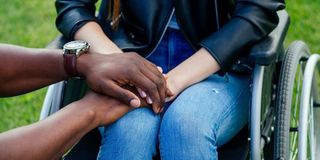Partners seek disability-inclusive response to Covid-19

What you need to know:
- Stress levels caused by economic hardships, restricted movements and social distancing, has contributed to high SGBV cases among persons with disabilities.
- At least 53 women and girls with disabilities have been subjected to SGBV since March 13, when Covid-19 was first declared in Kenya.
- Conducting court sessions on Zoom excludes blind people.
- NGEC working with the Ministry of Health to ensure healthcare needs of persons with disabilities are met.
Measures to contain Covid-19 in Kenya have accelerated vulnerabilities of women and girls with disabilities to sexual and gender-based violence (SGBV).
During a recent webinar titled GBV, Disability and Covid-19, deaf Program Officer at LVCT Health, Martin Oloo said unusual stress levels caused by economic hardships, restricted movements and social distancing, has contributed to high SGBV cases among persons with disabilities.
Since mid-March, women and girls with disabilities from Kisumu, Nairobi, Kilifi, Mombasa, Garissa and Lamu counties have reported SGBV abuses, he said.
“The pressure to get food yet they have no jobs and cannot move freely, is causing them untold stress,” he said through a sign language interpreter.
A food relief and an outreach comprehensive care initiative would save them from hunger and stress, he said.
At least 53 women and girls with disabilities have been subjected to SGBV since March 13, when Covid-19 emerged in Kenya, according to Director of Kenya National Deaf Women Peace Network Josephine Kakoma who attended the webinar.
Advocate of the High Court Rahab Mwathi observed that the Judiciary has failed women and girls with disabilities by not providing guidance on how to access justice.
“We have not had any circular touching on people with disabilities and how they are supposed to access courts. The circulars are not even in Braille,” she said.
BLIND PERSON
“We are conducting the court sessions on Zoom, which is utter exclusion of the blind person,” she added
She said ending SGBV requires gender inclusive messaging targeting men and boys alongside women and girls.
“Let us not invite only women and girls to public awareness forums. We must have the men and boys as anti-GBV champions,” she said.
Principal Program Officer at National Gender and Equality Commission (NGEC) John Nzomo said the commission is working with the Ministry of Health to ensure healthcare needs of persons with disabilities are met.
The Commission is also reviewing policies on SGBV prevention and response mechanisms for persons with disabilities to guide the government during and after the Covid-19 pandemic, he said.





